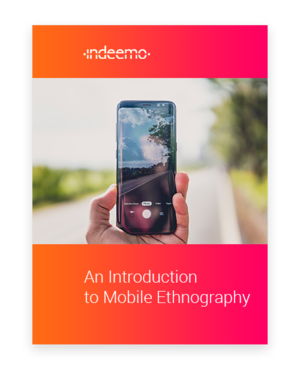Check out our White Papers
Learn how Indeemo can support your research projects and generate rich, contextual insights that help you better understand your target audience and build empathy across your entire organisation.

A transition to environmentally healthy ways of living and, more broadly, healthier sustainable lifestyles, is seen more than ever in innovation to public and private transport.

Over the past decade, sustainable and healthier ways for people to travel to and from work has become transformative in some societies. Of course there are leaders in this area. For example, over half of all school trips in the Netherlands are carried out through the use of bicycles.
More regions are embracing private electric vehicles also. At Indeemo, 2022 was a big year of User Experience Research and Market Research in the context of electric vehicles. A stand out insight from all of these projects was sustainability. This case study is no exception.

Our client approached us with a particular interest and research need. This need involved understanding the customer experience of new electric-vehicle (EV) users.
Digital Ethnography was the chosen methodology for this research project in order to capture a 360 view of their customer experience.
This included first impressions of their new vehicle, how they got set up, driving long and short distances, and experiences with charging the vehicle both at home and during journeys.
For this study, fieldwork duration was set to three weeks with a total sample of 20 e-vehicle users. A period of 3 weeks was chosen to give the EV owners sufficient time to undertake both short and long trips.
20 Respondents
6 Tasks
3 Week
Strategy: All-at-once Tasking
The ethnographic design for this study consisted of 6 different tasks, which were designed to be released to the respondents all at once. This means that from the outset and over the course of the fieldwork, respondents had access to all their tasks via Indeemo, and once they had completed one, they could simply move on to the next.
Timing of task completion within the three-week timeframe was at the discretion of the e-vehicle users. This gave respondents the flexibility to complete the tasks as naturally as possible without forcing them to change any of their everyday behaviours.

No requirement for in-person research - Participants can complete their tasks from the convenience of their residence.
Elimination of travel expenses and substantial decrease in idle time makes it a highly efficient method for researchers to conduct qualitative studies on a large scale.
Monitoring real-life actions provides more genuine perspectives than relying on participants' memory of past events. This eliminates worries about recall precision and eliminates potential biases in focus group discussions.
The scope of usage is extensive, including: day-in-the-life mobile diary studies, UX research, testing of ideas and products, path to purchase studies providing omnichannel customer insights, and research on service design and patient experiences.
Designed specifically for online qualitative research, the Indeemo App provides superior alternatives to Zoom Calls or WhatsApp research. Automated video transcription, push notifications, support for over 20 languages, a moderator dashboard, and mobile screen recording capabilities allow researchers to generate valuable insights for clients and stakeholders.
The data obtained from this study came in the form of video, photos and notes. All 20 participants were required to record (in the form of a video diary) their thoughts and feelings towards different aspects of their customer experience with the new e-vehicle. From this data there were a number of standout insights.
First, in the context of the customer experience, our client discovered a variety of pain points for their respondents. The data showed that the change from a standard fuel-powered car to an electric car proved difficult for some. Particularly with respect to behaviour changes when charging the vehicle. Journey Planning with EVs became critical in order to calculate your range and then ploat your course to factor in the location of charging stations. The respondents often found it difficult with timings for charging their new e-vehicle, along with trying to learn many aspects of the digital component.
However, whilst change is something we all struggle with at some point or another, the data from this study did highlight that customers become more conscious of their driving habits. Retrospectively, many respondents likened their commutes to when they drove fuel-powered cars. As such, through a reflection piece in the study, the many respondents articulated the benefits of transitioning to electric vehicles, noting that they felt they were playing their part to help the environment in some shape or form.
Lastly, from a methodological perspective, our client found that their digital ethnographic approach served a dual purpose without their anticipation. Initially, this study focused on the customer journey from the point of purchase, to receiving their new vehicle, getting set up, and integrating it into their lives. In addition however, the researchers were able to drill down further with the rich experience insights they surfaced.
Because the researcher suggested Respondents use Mobile Screen Recording as a way to share feedback, a lot of rich insights into the smartphone aspects of owning an EV were captured, such as in-app features which highlighted a number of areas of the user experience that prompted further exploration in follow on studies.
By keeping their tasking open ended, and giving Respondents to freedom to share however they wished, our client surfaced several unexpected UX insights that were not explicitly called out in the tasks.

Protected: Our exclusive connection with research participants provides unparalleled privacy and trust.
Safe: Login anonymity for participants and separate recruiter accounts prevent PHI from being disclosed.
Secure: Our platform has been thoroughly examined by leading healthcare organisations for maximum security.
GDPR Compliant
ISO 27001 Certified
Enterprise Ready
HIPAA Compliant
Learn how Indeemo can support your research projects and generate rich, contextual insights that help you better understand your target audience and build empathy across your entire organisation.



